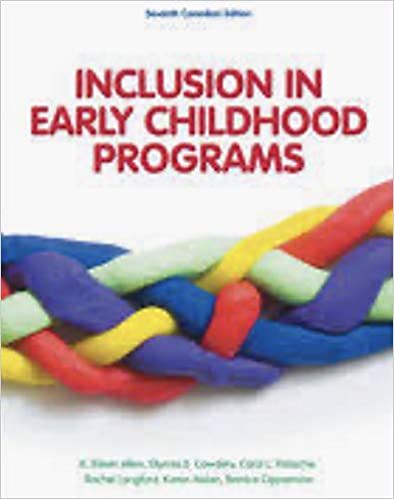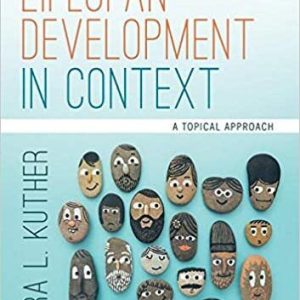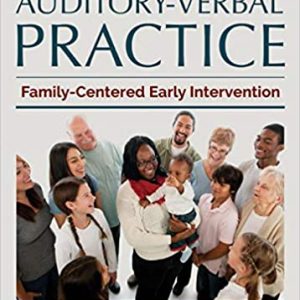Inclusion in Early Childhood Programs 7th Canadian Edition Seventh CDN ed
By: Allen, Cowdery, Paasche, Langford, Nolan, Cipparrone
- Publisher: Cengage Learning Canada Inc
-
eText ISBN: 9780176843168, 0176843167
- Edition: 7th
- Format : HIGH QUALITY PDF/PRINT REPLICA
$14
SECTION 1 Early Intervention
Chapter 1 An Inclusive Approach to Early Childhood Education and Care
Introduction
Inclusion Defined
Principles for Inclusive Early Childhood Programs
Inclusion in Perspective
Rationales for Early Childhood Inclusion
Supporting Inclusion: Implications for Teachers
Benefits of Inclusion for Young Children
The Concerns and Challenges of Inclusion
Key Concepts and Tetms
Summary
Resources
Chapter 2 Canadian Legislation: Support for Children through Early Intervention
Introduction
Federal Legislation in Canada
Provincial and Territorial Legislationfor Child Care
Educational Legislation in Canada
National Healthcare and Prevention in Canada
Key Concepts and Terms
Summary
Resources
Chapter 3 Partnership with Families
Introduction
Family Patterns and Expectations
The Family–Educator Partnership
Key Concepts and Terms
Summary
Resources
Chapter 4 Preparing Educators for Inclusive Programs
Introduction
The Educator Experience in an Inclusive Setting
An Inclusive Approach to Child Development
Characteristics of Effective Educators in Inclusive Settings
Key Concepts and Terms
Summary
Resource
SECTION 2 Developmental Differences
Chapter 5 An Overview of Developmental Differences
Introduction
What Is Normal or Typical Development?
Who Are Children with Disabilities?
Classification of Developmental Differences
Key Concepts and Terms
Summary
Resources
Chapter 6 Children with Cognitive Delays
Introduction
Characteristics of Cognitive Delays
Causes of Cognitive Delays
Risk Factors
Strategies and Ideas for Programming
Key Concepts and Terms
Summary
Resources
Chapter 7 Advanced Cognitive and Developmental Abilities: Children Who Are Gifted
Introduction
Origins of Giftedness
Characteristics of Young Children Who Are Gifted and Talented
Strategies for Supporting Young Children Who Are Gifted and Talented
Key Concepts and Terms
Summary
Resources
Chapter 8 Sensory Impairments: Hearing and Vision
Introduction
Hearing Impairments
Blindness and Vision Impairments
Key Concepts and Terms
Summary
Resources
Chapter 9 Orthopedic and Other Health Conditions
Introduction
Orthopedic Conditions
Program Implications of Orthopedic Conditions
Other Health Conditions
Nutritional Conditions
Health Conditions and Early Childhood Practices
Key Concepts and Terms
Summary
Resources
Chapter 10 Mental Health Disorders
Introduction
Emotional and Psychological Signals
Eating and Elimination Disorders
Social Adaptation Disorders
Mental Health Promotion and Prevention
Key Concepts and Terms
Summary
Resources
Chapter 11 Learning Disabilities
Introduction
Characteristics of Learning Disabilities
Key Concepts and Terms
SECTION 3 Planning for Inclusion
Chapter 12 Identification and the Individual Education Plan (IEP)
Introduction
The Process of Early Identification
The Educator’s Role in Early Identification
The Individual Education Plan (IEP)
Creation of the Task Analysis
Creation of an Implementation Plan
Key Concepts and Terms
Summary
Resources
Chapter 13 Planning Transitionsto Support Inclusion
Introduction
Transition Goals
Perspectives on the Transition
Transition Planning
Maintaining a Positive Placement Experience
Key Concepts and Terms
Summary
Resources
SECTION 4 Implementing Inclusive Early Childhood Programs
Chapter 14 Intervention with Specific Age Groups: Infants,Toddlers, and School-Aged Children
Introduction
Infant and Toddler Programs: An Overview
Infant and Toddler Intervention
Intervention for School-Aged Children
Key Concepts and Terms
Summary
Resources
Chapter 15 Arranging the Inclusive Learning Environment
Introduction
The Inclusive Environment
Arrangements for Learning
Considerations for Arranging an Inclusive Early Learning Environment
Scheduling
Scheduled Time for Educators
Transitions
Key Terms and Concepts
Summary
Resources
Chapter 16 Facilitating Social Development
Introduction
Social Skills and Overall Development
Appropriate Social Skills: What Are They?
Acquiring Social Skills
Promoting the Development of Social Skills
Key Concepts and Terms
Summary
Resources
Chapter 17 Facilitating Positive Behaviour (Managing Challenging Behaviours)
Introduction
Influences on Children’s Behaviours
When Is Intervention Necessary?
Impulse-Control, Conduct Disorders,and Disruptive Behaviours
Temper Tantrums
How to Prevent Challenging Behaviours
Stopping a Harmful Behaviour
Summary of General Strategies for Supporting Positive Behaviour
Summary
Resources
Chapter 18 Facilitating CognitiveLearning
Introduction
Implications of Brain Development for Educators of Young Children
Implications and Strategies for Supporting Active Learning in the Education of Young Children
Planning and Presenting Learning Experiences
Key Concepts and Terms
Summary
Resources
Chapter 19 Facilitating Speech, Language, and the Development of Communication
Introduction
Language Acquisition
Sequences in Language Acquisition
Learning Language and Loving It
Speech Irregularities
key Concepts and Terms
Summary
Resources
Glossary
References
Index
Blank Page
Showing 289–300 of 351 resultsSorted by latest



![Art and Creative Development for Young Children, [eighth ed] 8th Edition](https://medicalebooks.org/wp-content/uploads/2021/10/Art-and-Creative-Development-for-Young-Children-8th-Edition-300x300.jpg)













